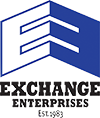Frequently Asked Questions About Barter or Trade
A: Simply – to make a profit. Trade is an inexpensive way for them to find new customers. And evey time they trade for something they need, they conserve cash.
Trading inventory or services to cover some expenses costs them less than paying with the proceeds from cash sales, so – they make a profit.
A: Yes! We are officially recognized under the “Tax Equity & Fiscal Responsibility Act” of 1982 in which companies like ours are identified as third-party record keepers, along with banks, securities brokers, attorneys and accountants.
Q: I need more cash business. Why should I trade?
A: The sales you make through The Exchange are truly “plus” business for you. If you did not belong to the Exchange you would never see these sales.
When you use the trade income from these sales to buy things you would otherwise have paid cash for, you are left with cash in hand to use for other things. The net effect is the same as if your cash sales were increasing.
Every time you save a cash dollar it is as good as earning an extra cash dollar.
Q: Which Barter Company Should I Choose? Why Choose Exchange Enterprises?
A: We are independently owned and operated and have been trading Goods & Services since 1983. We understand the many ways you can use your goods and services to generate non-cash income, get what you need and want, and build more traffic and referrals. We can put you in touch with barter resources accross the country, or introduce you to a new trading partner down the street. We offer all the tools you need to promote new business by using the resources you currently have.
The following checklist is a good tool to use:
How long has the barter company been trading goods and services?
Is the Barter Company independently owned or a franchise: if a franchise, how long has the franchisee been trading goods and services? (Not the corporate office?)
Ask for references of businesses that trade with them. Are they local to your business or home? Have you ever heard of the company?
Q: How do Exchange members determine prices?
A: Members sell to each other at their prevailing prices. They are not expected to sell at specially discounted prices – e.g., a clearance sale price.
At the same time, members must not inflate their prevailing prices when selling for trade dollars. One of the benefits of belonging to a barter group is the ability to buy at close to your wholesale cost of goods or services. Inflating prices erodes that benefit for other members and will lead to termination of the offending account.
Q: Are you part of a national network?
A: Yes. We are linked with other trade exchanges across America, which extends your buying power.
Q: How does barter work through Exchange Enterprises?
A: All members have individual accounts managed by The Exchange. Each account is provided with a debit card bearing that account’s name and number.
Transactions are handled similarly to the way they are when you use your bank debit card. When the member makes a purchase, the seller phones The Exchange for approval and that amount is then debited from the buyer’s account and transferred to the seller’s account.
At the end of each month every member receives an itemized statement showing sales, purchases and acccount balances. For more details, click on: How EE Barter Works or Contact Us.
Q: Can I spend trade dollars outside The Exchange’s immediate area?
A: Yes, you can. Through our contacts with other trade exchanges we frequently have trade opportunities from sellers in other states. Exchange members have traded millions of dollars with businesses at other trade exchanges across America since our founding in 1983.
Q: How are my taxes affected by trading?
A: Trade dollars are treated exactly the same as cash for tax purposes. For example, when your business sells for trade dollars, those dollars are part of its income in the tax year – just like cash.
If your business spends trade dollars on business-related items, those expenses should be offset against income – just like cash. (Exchange fees are tax deductible.)
If you or your employees spend trade dollars on personal items, those dollars are part of your taxable income – just like cash.
Q: How do I know how much barter income to include on my tax return?
A: At year end, The Exchange computes the proceeds from your barter sales and submits this information to the IRS on Form 1099-B. Be sure to include your bartering income from Form 1099-B in your total income when filing your tax return. You are also mailed a copy of this form for your records.
Q: Does it make sense trading for personal items?
A: It makes a lot of sense to pay yourself something extra out of the proceeds from any new business you generate, whether it is cash or trade. Paying some personal expenses with trade can help improve your standard of living – something every business owner aims to do.
Trade is a handy way of either making up for any shortfall in the cash you can take out of your business or simply adding to your personal income. Either way, it’s great to be able to pay yourself more without hurting your business.
Your question not answered here? Contact us today!
